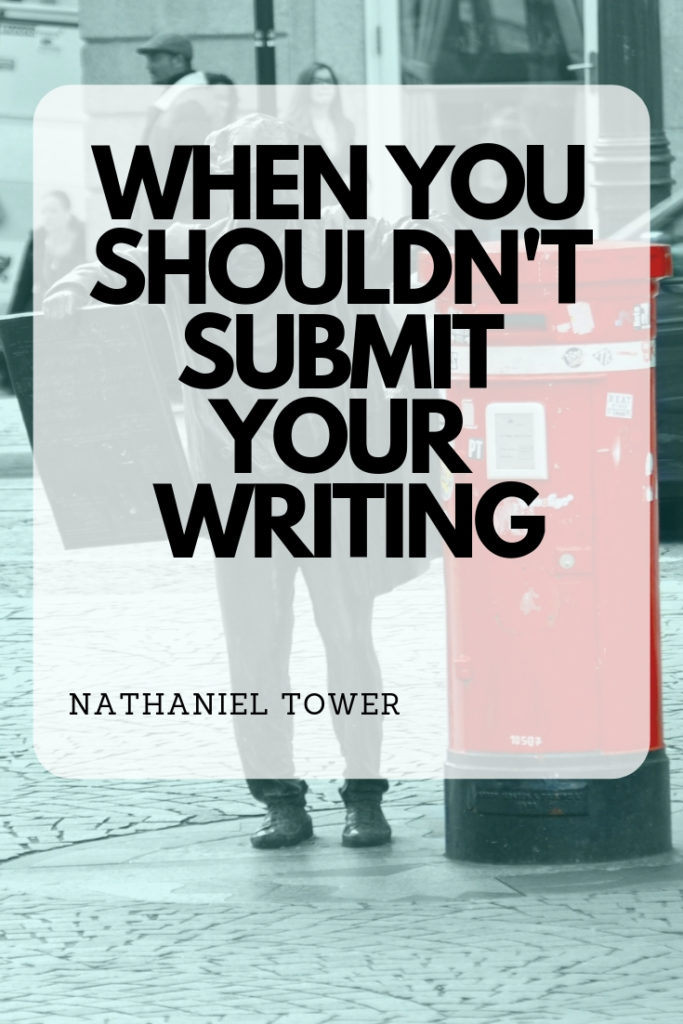Last Updated on January 15, 2019 by Nathaniel Tower
In the six years I’ve been a serious writer, I have submitted stories for publication over 1000 times. While I still have some things to learn about submitting, I’ve certainly come a long way during this period. I now know better than to finish typing a story and quickly send it off to Glimmer Train, The Missouri Review, or The New Yorker. That’s not to say that I shouldn’t ever submit to these venues. But at least now I know when I shouldn’t (which, coincidentally, is probably most of the time).
I’ve certainly made my fair share of submission faux pas over the years (addressing the submission to the wrong magazine, using the wrong manuscript format, attaching the document when I should’ve pasted it into the email, etc.). Ultimately, I don’t think anything I’ve ever done has actually cost me an acceptance (other than sending a story that wasn’t good enough or didn’t fit with that magazine), and I’ve learned some valuable lessons along the way. One of the most important things I’ve learned is when it’s best not to submit to a given venue. Here are my top five rules for when you shouldn’t submit.

When You Don’t Have Anything Worth Sending
All writers have folders on their computers with at least a few handfuls of unpublished stories. Within those handfuls are a fair number of stories that just aren’t publishable. It’s important as a writer to know what isn’t worth sending out. Don’t take these stories and send them to a place you view as an “inferior” publication. If you don’t think the story is good, don’t bother sending it anywhere (and if you don’t think the venue is good, then don’t bother submitting). I have a few published stories that make me cringe and wish I could take them back. As managing editor of Bartleby Snopes, I’ve had authors email and ask if I would remove their story from the website because they don’t really like it. If you don’t like the story, just don’t ever send it out, no matter how desperate you are to add another publication credit to your bio.
When You Don’t Have Anything That Fits
If you are looking at the submission guidelines and realize all of your stories are too short or too long or not the right genre, then skip that venue (unless you want to create a new story just for them). Don’t try to force something to fit their guidelines. Chances are, it will just get rejected anyway because they will know that you forced it.
Immediately After You Were Rejected (or Accepted)
We’ve all received the kind rejection letters that ask us to send something again in the future. When this happens, give the editor some space. Don’t hit reply with five new stories attached and a desperate cry of “Does one of these work for your awesome magazine?” Just give it some time. Submit something else in a month or two. The same actually goes for when you are accepted. Don’t immediately turn around and send more work (unless they actually ask for it). Editors are busy and don’t need you monopolizing their time.
Immediately After You Accept a Story from the Editor of Another Magazine
This one bugs me quite a bit as an editor. Luckily, it hasn’t happened too often. There have been times when I will receive an acceptance from a magazine, and the next day there will be a story from the accepting editor in the queue for Bartleby Snopes. This feels a bit too much like “I scratched your back, will you scratch mine?” We shouldn’t turn literary magazines into a favor for a favor. Then our publications will lose meaning. When I realize I’ve just accepted a story from another lit mag editor for publication in Bartleby Snopes, I generally take that journal off my list of places to submit. That doesn’t mean I won’t ever submit there, but I definitely won’t do it right away. It can create a very uncomfortable situation for everyone. Besides, do you really want to receive an acceptance knowing that it might not be for the right reason?
When You Have No Intention of Ever Reading that Magazine
We all know that we aren’t going to become devoted fans of every publication that accepts our work. However, if you have no intention of ever reading any other stories that the magazine publishes, then you shouldn’t bother to submit. Instead, focus on getting your work accepted in venues that you actually enjoy. This will make those acceptances a lot more meaningful in the end.
There are plenty of other reasons why you shouldn’t submit to a particular magazine, but these are some that I think are the most important. No matter how often you submit or where you submit your work, you should always be respectful and only send out your best. In the end, good rejections are a lot more satisfying than bad publications.

Good advice! Thanks!